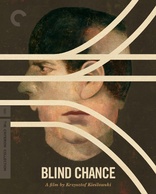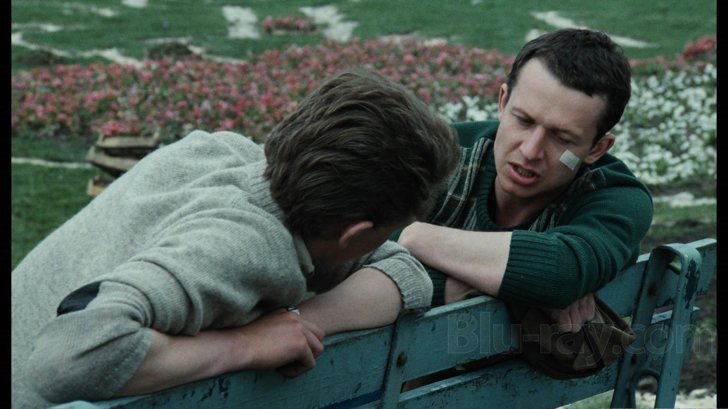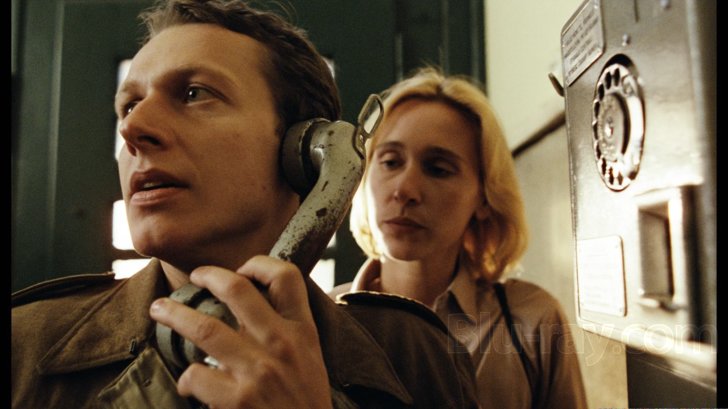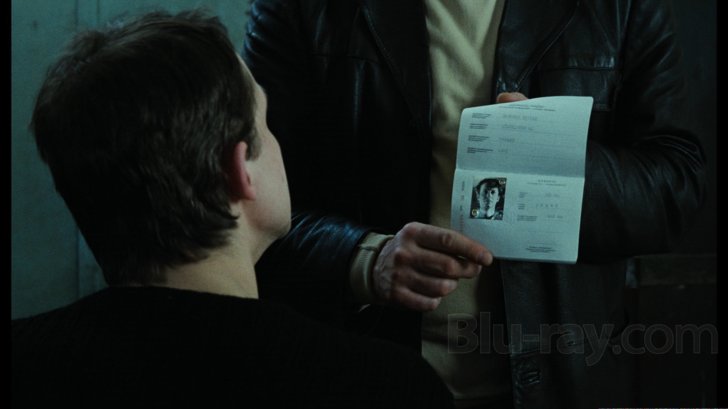Blind Chance Blu-ray Movie
HomeBlind Chance Blu-ray Movie 
Przypadek / Uncensored VersionCriterion | 1987 | 123 min | Not rated | Sep 15, 2015

Movie rating
7.2 | / 10 |
Blu-ray rating
| Users | 5.0 | |
| Reviewer | 4.0 | |
| Overall | 4.0 |
Overview
Blind Chance (1987)
Witek runs after a train. Three variations follow on how such a seemingly banal incident could influence the rest of his life.
Starring: Boguslaw Linda, Tadeusz Lomnicki, Zbigniew Zapasiewicz, Boguslawa Pawelec, Marzena TrybalaDirector: Krzysztof Kieslowski
| Foreign | Uncertain |
| Drama | Uncertain |
Specifications
Video
Video codec: MPEG-4 AVC
Video resolution: 1080p
Aspect ratio: 1.72:1
Original aspect ratio: 1.66:1
Audio
Polish: LPCM Mono
Subtitles
English
Discs
50GB Blu-ray Disc
Single disc (1 BD)
Playback
Region A (locked)
Review
Rating summary
| Movie | 4.5 | |
| Video | 4.0 | |
| Audio | 5.0 | |
| Extras | 3.0 | |
| Overall | 4.0 |
Blind Chance Blu-ray Movie Review
Reviewed by Dr. Svet Atanasov September 3, 2015Krzysztof Kieslowski's "Blind Chance" a.k.a. "Przypadek" (1987) arrives on Blu-ray courtesy of Criterion. The supplemental features on the disc include an exclusive new interview with Polish film critic Tadeusz Sobolewski; archival video interview with writer/director Agnieszka Holland; and nine sections from the film original censored by the Central Film Board in Poland. The release also arrives with an illustrated leaflet featuring an essay by film critic Dennis Lim and a 1993 interview about the film with director Krzysztof Kieslowski. In Polish, with optional English subtitles for the main feature. Region-A "locked".

"He wanted me to be a decent man..."
Krzysztof Kieslowski completed Blind Chance in 1981, but the film was immediately banned and wasn’t officially released until 1987. It is easy to see why the communist authorities did not like it. It was a real eye-opener that spoke against the system they were a part of and questioned their idealism.
The main character in the film is Witek (Boguslaw Linda, Szamanka), a young medical student who understands that he is approaching the crossroads of life and very soon he will have to choose a direction. But he is unsure if he should follow his heart or mind -- or if it actually matters what he does.
Kieslowski gives Witek three chances to make the right decision and divides the film into three sections. Each section begins at the train station in Lodz where Witek is trying to catch a train to Warsaw, but is running late.
In the first section Witek gets on the train and befriends a veteran communist with influential friends who effectively redirects his life. Soon after he joins the Party, however, Witek begins to realize that no one can be trusted because the entire system he has become a part of is built upon fear, lies, and deceit.
In the second section Witek misses the train and knocks over a policeman. He is promptly arrested and then sent to prison, where he is introduced to the leader of an underground political movement. After he is released, Witek joins a group of anti-communist activists and eventually becomes a Catholic.
In the final section Witek finishes his medical degree and reconnects with a former lover. This time he tries to avoid both sides -- the communists and their informers and the various groups that have started questioning the political status quo in the country -- but eventually realizes that it will be impossible to remain neutral.
The film is extremely pessimistic but incredibly accurate. The three scenarios Kieslowki presents in it are exactly the types of lives people in the countries from the former Soviet bloc used to settle for -- controlled and filled with never-ending lies lives that would either corrupt or destroy them.
What makes the film truly special, however, is the fact that it also predicted the erosion and inevitable collapse of the communist system. Indeed, Kieslowski shot the film shortly after Solidarity had emerged in Poland but before the communist government imposed the martial law that aimed to eliminate it (though the final work on it was apparently done during the martial law). So the large-scale protests in the big cities that are mentioned in the middle section had not yet taken place. (The independent trade union Solidarity was formed in 1980. A year later, General Wojciech Jaruzelski‘s communist government imposed a martial law, Solidarity was outlawed, and many of its leaders, including its most prominent figure, Lech Wałęsa, were arrested).
Kieslowki and cinematographer Krzysztof Pakulski‘s preference for cold blues, browns and grays could not have been more appropriate. The bulk of the film looks notably gloomy, at times even unsettling. And this is exactly how the former communist countries in Central and Eastern Europe looked even in the early ‘80s -- dirty, depressing and unfriendly, as if they had just started recovering from the war.
Note: Criterion's release presents Blind Chance in its complete original form. However, a very short censored fragment remains in the beginning of the second section, where Witek is arrested. (Only the original audio is included).
Blind Chance Blu-ray Movie, Video Quality 

Presented in an aspect ratio of 1.72:1, encoded with MPEG-4 AVC and granted a 1080p transfer, Krzysztof Kieslowski's Blind Chance arrives on Blu-ray courtesy of Criterion.
The following text appears inside the leaflet provided with this Blu-ray release:
"The uncensored version of the film included here was restored in 2012 by TOR Film Studio in Warsaw. This digital transfer was created in 4K resolution on an ARRISCAN film scanner from the 35mm original camera negative and a 35mm print at Chimney Pot in Warsaw, and restored in 2K resolution. The complete restoration was approved by cinematographer Krzysztof Pakulski.
Transfer supervisors: Jedrzej Sablinski, Julia Skorupski/DI Factory, Warsaw.
Colorist: Wiktor Sasim/Chimney Pot, Warsaw."
The film looks strikingly healthy. When there is an abundance of natural light the visuals are very impressive, boasting clarity, depth and fluidity that only a very recent 4K scan could produce. Image stability is also terrific. Grain is evenly distributed and beautifully resolved. Also, there are absolutely no traces of compromising sharpening adjustments. Colors are stable and far better balanced than they were on the R2 DVD release of the film from Artificial Eye. This being said, there are a couple of sequences where the brightness levels appear a bit too low. As a result, there are some light crushing effects. (You can see examples in screencaptures #12 and 13). They do not become overly distracting, but the brightness levels could have been managed better. Still, this is the best presentation of Blind Chance that I have seen to date. (Note: This is a Region-A "locked" Blu-ray release. Therefore, you must have a native Region-A or Region-Free player in order to access its content).
Blind Chance Blu-ray Movie, Audio Quality 

There is only one standard audio track on this Blu-ray release: Polish LPCM 1.0. Optional English subtitles are provided for the main feature.
It is immediately obvious that the audio has been fully remastered. The beautiful piano and oboe solos, for instance, sounds crisp and lush and the high-frequencies are rock solid. The dialog is stable, clean, and exceptionally easy to follow. Also, depth is excellent throughout the entire film. There are no audio dropouts, pops, or distortions to report in our review.
Blind Chance Blu-ray Movie, Special Features and Extras 

- "Blind Chance" Unshelved - in this brand new video interview, Polish film critic Tadeusz Sobolewski discusses the socio-political climate in Poland at the time when Krzysztof Kieslowski shot Blind Chance and the film's placement in the director's body of work. The interview was conducted exclusively for Criterion in 2015. In Polish, with optional English subtitles. (19 min, 1080p).
- Agnieszka Holland - in this video interview, writer/director Agnieszka Holland (Europa Europa, To Kill a Priest) discusses her initial impressions of the rough cut of Blind Chance, the unique structure of the narrative (and how later on it was copied by other directors), and some of the difficulties Krzysztof Kieslowski had to overcome during the shooting of the film. The interview was conducted in 2003. In French, with optional English subtitles. (6 min, 1080i).
- Censored - in 1981, when Krzysztof Kieslowski completed Blind Chance, the Central Film Board in Poland stopped the film's release, finding the content political objectionable. Six years later, the board decided to distribute it, along with several other shelved films, although in a censored form. Presented here are the nine sections of Blind Chance that were altered. The censored segments are presented in color. In Polish, with optional English subtitles. (10 min, 1080p).
- Leaflet - an illustrated leaflet featuring an essay by film critic Dennis Lim and a 1993 interview about the film with director Krzysztof Kieslowski.
Blind Chance Blu-ray Movie, Overall Score and Recommendation 

The three chances Krzysztof Kieslowski gives Witek to choose a direction in his life produce the three scenarios people in the countries from the former Soviet bloc were offered during the Cold War -- one could become part of the system and blindly support it, one could reject it and try to expose its hypocrisy but risk one's life, and one could struggle to remain neutral until one eventually realizes that doing so is impossible. Blind Chance has been recently restored in 4K by TOR Film Studio in Warsaw. It is the best presentation of the film that I have seen to date. HIGHLY RECOMMENDED.
Similar titles
Similar titles you might also like

Dekalog
The Decalogue
1988

Pather Panchali 4K
পথের পাঁচালী / Song of the Little Road
1955

Wrong Move
Falsche Bewegung
1975

Like Someone in Love
ライク・サムワン・イン・ラブ / Raiku samuwan in rabu
2012

Elena
Елена
2011

Transit
2018

Wild Strawberries
Smultronstället
1957

The Image Book
Le livre d'image
2018

Zama
2017

Café de Flore
2011

La Chinoise
1967

Before the Revolution
Prima della rivoluzione
1964

2 or 3 Things I Know About Her
2 ou 3 choses que je sais d'elle
1967

Yi Yi
2000

Peppermint Candy
박하사탕 | 4K Restoration
1999

Hard to Be a God
Трудно быть Богом
2013

Three Colors: Red
Trois couleurs: Rouge
1994

Aparajito 4K
অপরাজিত / The Unvanquished
1956

Apur Sansar 4K
অপুর সংসার / The World of Apu
1959

The Silence
Tystnaden
1963